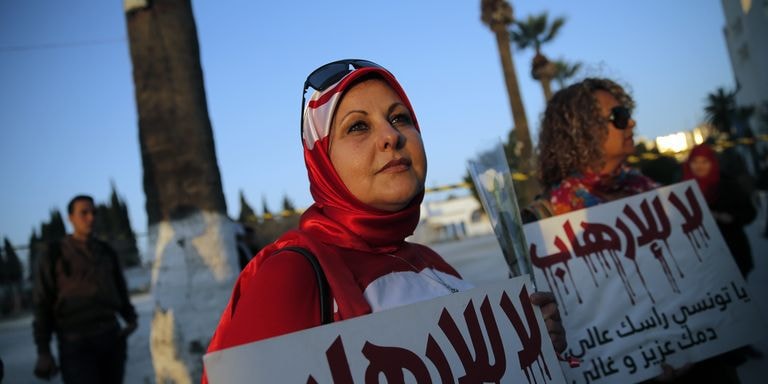Tunisia: Anti-terrorism march
(Baonghean) - On Sunday, March 29, Tunisia held an anti-terrorism march with the presence of government officials at home and abroad as well as thousands of people, especially after the bloody attack at the Bardo Museum on March 18. Speaking at the opening of the march, Prime Minister Habib Essid announced that the leader of the armed group that carried out the attack on March 18 was eliminated on Saturday.
In addition to high-ranking Tunisian officials, many leaders of countries such as French President Francois Hollande, Polish President Bronislaw Komorowski, Palestinian President Mahmoud Abbas and ministers from Italy, Algeria, Spain and the Netherlands also attended the march. The march began at around noon local time (around 8:00 p.m. Vietnam time). The leaders will walk around the Bardo Museum area for about 100 meters before cutting the ribbon to inaugurate a monument in memory of the 22 victims killed in the attack on March 18.
 |
| Tunisian people during a march on March 29. Photo: AFP |
“Our patriotism must be at the forefront of our minds at this time,” Tunisian Tourism Minister Salma Elloimi Rekik said on television. Rekik stressed that the attack had dealt a blow to Tunisia’s tourism industry, but that it would not kill it but rather make it stronger. On Wednesday, President Caid Essebsi called on people to take part in the march to “show Tunisia’s strength” and “send a message to other countries that Tunisia continues its fight against terrorism.”
Tunisia, a country considered one of the pioneers of the “Arab Spring”, completed its transition with elections in 2014. However, the country’s stability is threatened by the rise of threats from radical Islamic jihadists as well as economic and social difficulties, the underlying cause of the revolution in 2011. In addition, tourism is one of the main sources of income for Tunisians. Therefore, the terrorist attack on March 18 that killed 21 foreign tourists and 1 security officer has greatly affected the tourism image of Tunisia, which was heavily affected by the “Arab Spring” revolution.
On this occasion, the Tunisian government confirmed the killing of Abu Sakhr, leader of the Jihah Tinisia armed group, and nine extremist jihadists in the Gafsa area on March 28. According to authorities, this armed group was behind the attack on the Bardo Museum on March 18.
Chu Thanh(According to Le Monde March 29)
| RELATED NEWS |
|---|






